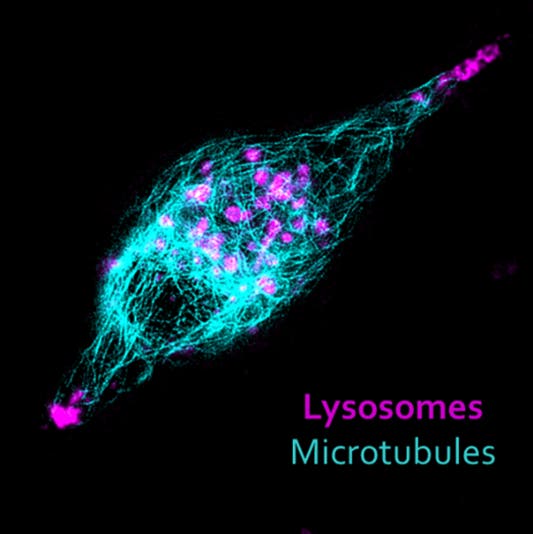NWO ENW-KLEIN grant for research molecular mechanisms of lysosome-driven 3D cancer cell invasion

Nalan Liv, PhD in Imaging Physics and Postdoc in Cell Biology, received an NWO ENW-KLEIN grant to study the molecular mechanisms of lysosome-driven 3D cancer cell invasion by high-resolution correlative light and electron microscopy.
Summary
Transformation of lysosomes is a long-known trait of cancer cells. Lysosomes are the main degradative compartments of the cell and central in regulating the delicate balance between anabolism and catabolism. How lysosome transformation occurs in cancer cells and how this translates into cancer progression is not known, but clearly of great importance. A major obstacle has been the lack of suitable imaging methods to follow single lysosomes in migrating cancer cells. Recently, I overcame these obstacles by developing a novel correlative 3D live-cell to electron microscopy (3D- CLEM) method. 3D-CLEM is at the cutting edge of cellular microscopy, and for the first time provides an elegant way to link molecular composition and dynamic behaviour of organelles to their ultrastructure with nm resolution. Within this project I will advance the 3D-CLEM approach into a high throughput method, and complement it with mass spectroscopy to establish the molecules and pathways that regulate the lysosomal transformation in cancer cells. These studies will lead to novel fundamental insights in lysosome biology and can reveal thus-far unexplored targets for cancer therapies.
An original angle to cancer studies
Recently Nalan obtained a permanent position in the UMC Utrecht Cell Biology section, and she is setting up her own research line dedicated to high-resolution understanding of organelle functions in cancer biology. Just like her expertise (PhD in Imaging Physics and Postdoc in Cell Biology), this ambitious project is positioned at the interface of advanced microscopy and cancer cell biology, two separate fields of research that are traditionally addressed by different researchers. The project therefore provides a very original angle to cancer studies, and is an important step for me to establish my research niche as a microscopy-focused cell biologist.
This project will be a new and independent line of research in the Cell Biology section of Center for Molecular Medicine. The reprogramming of intracellular organelle dynamics and interactions is a crucial, previously unrecognized mechanism regulating cancer cell metabolism. My research at the intersection of cell biology, cancer research and advanced microscopy will provide insight into how cellular trafficking process are rewired in cancer and thereby aim to identify new avenues for anti-cancer therapeutics.
